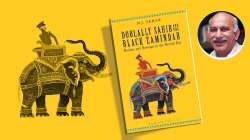MJ Akbar's book, ‘Doolally Sahib...' talks about deeply ingrained conviction of the white superiority
The author also wrote on the British officers' expensive lifestyle and their exploitation.

In July 1765, Colonial administrator Robert Clive, in a letter to Sir Francis Sykes, compared the ancient city of Gomorrah, known for its corruption and depravity to Calcutta, the then capital of British India.
Clive, who was the first governor of Bengal Presidency under the East India Company in the 18th century, wrote a letter to East India Company official Sir Francis Sykes. Comparing Gomorrah to Calcutta, Clive wrote, “I will pronounce Calcutta to be one of the most wicked places in the Universe. Corruption licentiousness and want of principle seem to have possessed the minds of all the civil servants, by frequent bad examples they are grown callous, rapacious and luxurious beyond conception.”
Reflecting on the letters, drawing historical accounts and journals, MJ Akbar's new book ‘Doolally Sahib and the Black Zamindar: Racism and Revenge in the British Raj’, is a chronicle of racial relations between Indians and their last foreign invaders.
But, who exactly was Doolally Sahib? "Doolally Sahib was a caste by himself. Disliking and disliked. Foolish and surly with national pride. Bullying. Insolent. Insular. The Black Zemindar served, survived and lay in wait,'' describes the author.
A multitude of vignettes, combined with insight and analysis, the book reveals the deeply ingrained conviction of the white superiority that dominated and played a vital part in pre-independence Indian history. The white domination was best illustrated by the fact that the British abandoned a large community of their own children because they were born of Indian mothers.
The author also wrote on the British officers' expensive lifestyle and their exploitation.
“All presents between 1,000 and 4,000 now required permission—anything above that went into Company coffers. This shocked and infuriated Company officials, who believed that they needed 3,000 pounds a year to maintain their lifestyle, and thrice that amount to take back as retirement benefits, at a time when the salary of a member of the governor’s council was 330 pounds.”
“The historian Percival Spear, using florid metaphors appropriate to colourful larceny, writes: ‘The brotherhood of exploitation, the freemasonry of graft, had been violated. Clive had put himself outside the pale. They sharpened their mental knives of revenge on the grindstone of hate while dipping their quills of complaint in the ink of defamation’,” the book said.